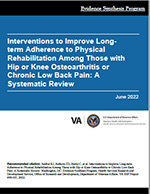
|
Recommended citation: |
Download PDF: Complete Report, Executive Summary, Report, Appendices
Long-term sustainment of functional improvements gained by short-term rehabilitation programs requires ongoing adherence to recommended home exercise regimens well past the end of clinical treatment. Based on a small body of literature, there is inconclusive evidence of the impact of interventions promoting long-term adherence to home rehabilitation programs on functional improvement or adherence. Existing studies generally did not employ strategies specifically targeting the maintenance of recommended rehabilitation behaviors or use theory-driven approaches to intervention development.
As requested by VHA's Rehabilitation Research and Development Service (RR&D), this review aims to evaluate the impact of physical rehabilitation interventions, supplemented with one or more adherence-enhancing adjunct components, on the following outcomes among adults with hip or knee OA or chronic LBP: (1) adherence, (2) functional improvements, and (3) self-efficacy at > 3 months after completing an index rehabilitation program.
We identified 10 studies that evaluated adjunct adherence-enhancing interventions: 6 were delivered concurrent to an index rehabilitation program and 4 were delivered sequentially. Seven studies targeted patients with knee and/or hip osteoarthritis. Of the 3 studies that reported a positive effect on long-term adherence, only 1 was a low risk of bias study. This study was also the only one identified that employed theory-based behavior strategies targeting the maintenance (vs initiation) of rehabilitation behaviors. Included studies offered no evidence of a significant treatment effect on long-term physical function, self-efficacy, or adverse events. An additional limitation of the existing evidence is the significant overlap of specific behavior change techniques between comparator and intervention arms. No studies provided a rationale for this overlap. Future research could expand the use of behavior change techniques and focus on differences in initiation of behavior change versus behavioral maintenance. Additionally, future research should describe usual care comparators in detail and use objective and validated outcome measures.
Interventions to Improve Long-Term Adherence to Physical Rehabilitation among Those with Hip or Knee Osteoarthritis or Chronic Low Back Pain: A Systematic Review (Management Brief)
Burke CA, Seidler KJ, Rethorn ZD, et al. Interventions to Improve Long-Term Adherence to Physical Rehabilitation: A Systematic Review. Journal of Geriatric Physical Therapy. 2024. DOI: https://doi.org/10.1519/JPT.0000000000000402.